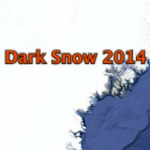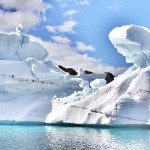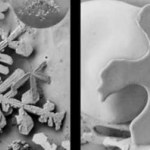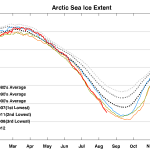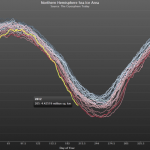Greenland
Photo of a Greenland shark from Wikipedia.
A multi-national team of scientists sought to determine the age of Greenland sharks (Somniosus microcephalus). These animals grow rather slowly (about 1cm per year) and are the largest fish in the arctic (>500 cm long), but their longevity was not yet known. The team used radiocarbon dating of crystalline proteins found within the nuclei of the eye lens. Because these proteins are formed prenatally, they offer a rather accurate way to estimate an animal's age. Their findings, published in Science…
The Dark Snow Project is staring up again, it being almost summer(ish) in Greenland.
The results in the study of the odd 2012 winter are now in. That year, there was a huge spike in melting on the surface of Greenland. (Discussed here.) One idea is that a good part of this melting was caused by extra soot from extensive wildfires in North America, which increased the amount of solar energy collected on the ice surface.
The results confirm this, and the Dark Snow team is returning this year to collect more information.
Here's a video giving an overview of the project, from Peter Sinclair'…
A paper came out in today’s Nature about glacial melting and its contribution to sea level rise. This paper does not present new research, but rather summarizes and evaluates the last several years of research on modeling and measuring contiental glaciers and their dynamics.
From the Abstract:
Since the 2007 Intergovernmental Panel on Climate Change Fourth Assessment Report, new observations of ice-sheet mass balance and improved computer simulations of ice-sheet response to continuing climate change have been published. Whereas Greenland is losing ice mass at an increasing pace, current…
You know about Albedo. No not Libido, Albedo. Sunlight is to varying degrees reflected off the surface of the earth more or less back into space. That is Albedo. The vast regions of snow and ice covered glacial surfaces in the northern and southern Polar regions contributes to a good amount of the Earth's Albedo. In the north, the biggest chunk of that is the ice-covered subcontinent of Greenland.
Over the last several years, Greenland's Albedo has diminished. This was in part predicted by scientists who expected that warmer conditions would change the nature of ice and snow crystals…
We are becoming aware of two very important changes in the Arctic that you need to know about. These are separate thing but related, and both are almost certainly the outcome of anthropogenic global warming (AGW). They are:
The sea ice that covers much of the Arctic Sea during the winter is normally reduced during the northern summer, but this year, the reduction has been dramatic. There is less sea ice in the Arctic Circle than recorded in recent history.
The massive continental glacier on Greenland, the largest glacial mass in the Northern Hemisphere, has undergone more melting this…
Some interesting goings-on in the cryosphere these days.
In this chart (click the link for an interactive, larger resolution version) from the cryosphere today we can see that we are on the 45th day in a row of daily record lows in sea ice area.
Note that this is area which is different from extent. Area refers to the actual ice cover, I am not sure of the details of how that is defined in practice, whereas extent refers to any ocean surface that contains 15% or more ice cover. Again, there will be technical details I am not familiar with for determining the edges of extent (e.g.…
I found this from a comment on a Skeptical Science article (worth a read in its own right) and thought readers here might be impressed.
It is from a TED talk by James Balog who has been creating fascinating and awe inspiring time-lapse videos of calving glaciers. The whole talk is about 20 minutes and worth listening to, if you must you can jump ahead to around the 9th minute when the set-up ends and the visuals begin:
Of course, the whole thing could have been cooked up by Phil Jones and CRU, with help from the NASA moon-landing fakers...
Interesting that I just pointed to Neandertal DNA, a really big story just came out on ancient Greenlander genetics, Whole Genome of Ancient Human Is Decoded:
The genome of a man who lived on the western coast of Greenland some 4,000 years ago has been decoded, thanks to the surprisingly good preservation of DNA in a swatch of his hair so thick it was originally thought to be from a bear.
This is the first time the whole genome of an ancient human has been analyzed, and it joins the list of just eight whole genomes of living people that have been decoded so far. It also sheds new light on the…
tags: Greenland, image of the day
Grønland fra luften (Greenland from roughly 38,000 feet up).
Image: GrrlScientist, 10 March 2009 [larger view].
Can someone tell me; are those (relatively) straight lines fault lines?
tags: Greenland, image of the day
Grønland fra luften (Greenland from roughly 38,000 feet up).
Image: GrrlScientist, 10 March 2009 [larger view].
Several readers have emailed me to comment on Michael Steele's ummmm...imaginative explanations of both global 'cooling' and Greenland:
"We are cooling. We are not warming. The warming you see out there, the supposed warming, and I am using my finger quotation marks here, is part of the cooling process. Greenland, which is now covered in ice, it was once called Greenland for a reason, right? Iceland, which is now green. Oh I love this. Like we know what this planet is all about. How long have we been here? How long? No very long."
You want me to respond to that gibberish? Seriously? The…
A story on the fate of Greenland's ice sheet published last week in The Guardian attracted the expected level of interest from those who uncritically repeat any scientific tidbit that reminds us we still don't know everything we need to know about climate change. This was because the story, as written, implied the ice sheet isn't as sensitive to global warming as is popularly thought.
Something about the story didn't seem exactly right to me, though. For one thing, it was based not on a peer-reviewed paper but a presentation to the recent scientific meeting on climate change in Copenhagen.…
